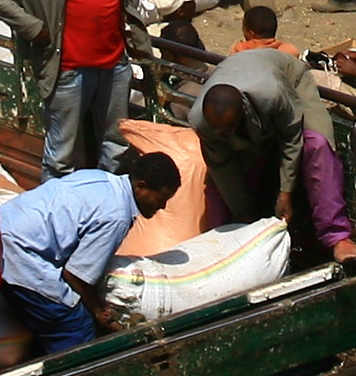 Earlier this month, the G-8 pledged $20 billion to fight increasingly widespread hunger in Africa. Next week, USAID will begin emergency food assistance to 2.8 million people in Zimbabwe. But at least one economist is cautiously optimistic about Africa’s ability to maintain the modest but steady economic progress it achieved before the global economic downturn.
Earlier this month, the G-8 pledged $20 billion to fight increasingly widespread hunger in Africa. Next week, USAID will begin emergency food assistance to 2.8 million people in Zimbabwe. But at least one economist is cautiously optimistic about Africa’s ability to maintain the modest but steady economic progress it achieved before the global economic downturn.
When MIT and Harvard-trained economist Edward Miguel‘s book, Africa’s Turn, was published in November 2008 he argued that ‘it is now possible to wonder whether the terrible decades of war, famine, and despair are finally over.”
Miguel points to democratic reforms and peaceful elections in Tanzania and Ghana as examples of ongoing political stability. In Botswana, he says the government continues to carefully manage the country’s mineral wealth.
Many of Africa’s resource-rich nations reaped record profits from high commodity prices in the past decade but have since seen prices drop.
Now, more than half a year into the global economic crisis, Miguel told WIDE ANGLE “there have been positive developments in the past ten years that should help African countries weather the storm.”
Sierra Leone may be a test case for maintaining Africa’s success. The country endured a civil war from 1991 to 2001, and then experienced rapid economic growth due in part to its diamond export industry. Those commodities are now worth less, but Miguel hopes the country can still continue its series of peaceful elections.
“We may look back on the last decade as a golden era in Africa’s development,” said Miguel. “But Africa’s growth is based on more than commodity prices.”
He argues that traditional infrastructure such as roads that are key for transporting goods are important for governments to build even with limited resources. Just as important is new technology infrastructure such as cell phone networks.
Miguel’s colleague, Tufts University economic professor, Jenny Aker, studied how the introduction of cell phones to the grain markets in Niger allowed traders to search for the optimal sales prices in far-flung markets. Her research showed that cell phones improved both trader and consumer welfare in Niger, and may have averted an even worse outcome during a 2005 food crisis.
“While basic needs cannot or should not be overlooked, cell phones could be a powerful development tool for farmers, traders and consumers,” noted Aker.
More wide scale reforms such as the introduction of a commodities exchange market in Ethiopia may also help farmers to get the best prices for their goods. Miguel argues the exchange – combined with traditional and new technological infrastructure – is “one piece of the puzzle” that will allow Africa to overcome its reliance on foreign aid even during the economic crisis.
This week PBS WIDE ANGLE travels to East Africa to tell the dramatic story of an Ethiopian economist on a mission. Seeking a market-based solution to ending hunger in her famine-plagued country, she creates Ethiopia’s first commodities exchange. Check your local PBS listings for air times for The Market Maker.
